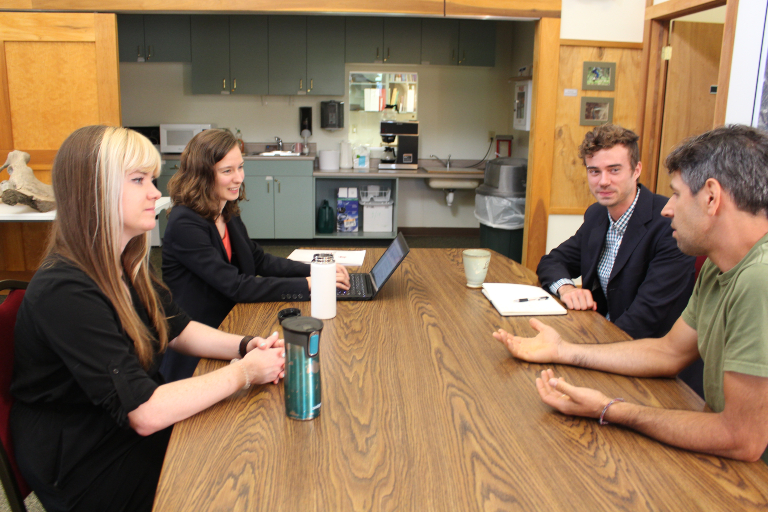Up to nine local governments in Indiana will be developing plans in 2020 to address greenhouse gas emissions as part of the next phase of an Indiana University program.
Building on the success of the 2019 Resilience Cohort program, local governments will be working with IU students and staff to identify actions, policies, and programs to reduce emissions, an important step toward building community-scale resilience against climate change.
The Resilience Cohort program matches Indiana communities with the tools, training, and expertise needed to measure and reduce local greenhouse gas emissions. The program launched last summer through a partnership between Sustain IU and the Environmental Resilience Institute, part of the IU Prepared for Environmental Change Grand Challenge initiative. Since then, organizations in other parts of the country are looking to IU's Resilience Cohort as a model.

In 2020, cohort members will be developing climate action plans that will outline specific activities a community will undertake to achieve reduced emissions targets. The plans will then be presented to the mayor, city or town council, or county commissioners for review and approval. Program participants will be announced early next year.
“These climate action plans are a critical step for communities who want to address locally produced greenhouse gases that contribute to climate change,” said ERI Director Janet McCabe. “In addition to lowering a community’s climate impact, implementing these plans will lead to immediate community benefits like green jobs, lower utility bills, and improved air quality. We’re looking forward to partnering with local governments on this important work.”
With funding from the McKinney Family Foundation, IU student externs will help local governments coordinate community input and prioritize reduction actions as part of Sustain IU’s Indiana Sustainability Development Program.
“We are tremendously proud of the student sustainability externs who are implementing this important project,” said Bob McKinney, chairperson of the McKinney Family Foundation. “Enabling municipalities to create climate action plans is emblematic of our goal to empower Indiana communities to live in a healthier, more prosperous, and more sustainable manner."
Additional funding provided by the Duke Energy Foundation will enable the Resilience Cohort program to add a part-time coordinator and to provide technical resources and training through ICLEI-Local Governments for Sustainability, a nonprofit that specializes in helping local governments with emissions inventories. The training will help local governments set goals, forecast multiple greenhouse gas scenarios, and engage community stakeholders prior to drafting a climate action plan.
"As we work to reduce carbon emissions on our own system, we also are supporting our communities as they develop their own action plans," said Bruce Calloway, Duke Energy's government and community relations manager for Bloomington. "We appreciate IU's leadership on this unique approach to tackling environmental challenges."

Though the effects of climate change are already being felt in the Midwest, most Indiana communities do not have access to experts who can help them identify adaptation and mitigation strategies, such as cutting emissions. That’s where the Resilience Cohort makes a difference. Last year, 14 local governments, representing Indiana cities, towns, and counties joined the program and completed greenhouse gas inventories for the first time.
Prior to the 2019 Resilience Cohort, Indianapolis, Bloomington, and South Bend were the only Indiana cities to have conducted greenhouse gas inventories of their own. Now eight of the 10 largest Indiana cities, representing 35 percent of the state’s population, have completed inventories using recent data.
“The inventories give local officials and residents a comprehensive picture of emissions sources in their community,” said Andrea Webster, ERI’s Implementation Manager. “For example, the City of Gary found that 77 percent of the city’s annual emissions come from industrial sources, while in Bloomington, transportation accounts for the largest slice of emissions at 27 percent. That’s valuable information that can inform a plan of action.”
Beyond the inventories themselves, local governments who participated in the 2019 Resilience Cohort program increased their staff knowledge and gained insights into how climate adaptation and mitigation aligns with their communities’ long-term goals.
About the Prepared for Environmental Change Initiative
The Indiana University Prepared for Environmental Change Grand Challenge initiative brings together a broad, bipartisan coalition of government, business, nonprofit and community leaders to help Indiana better prepare for the challenges that environmental changes bring to our economy, health and livelihood. Announced in May 2017, Prepared for Environmental Change is working to deliver tailored and actionable solutions to communities across the state of Indiana.



